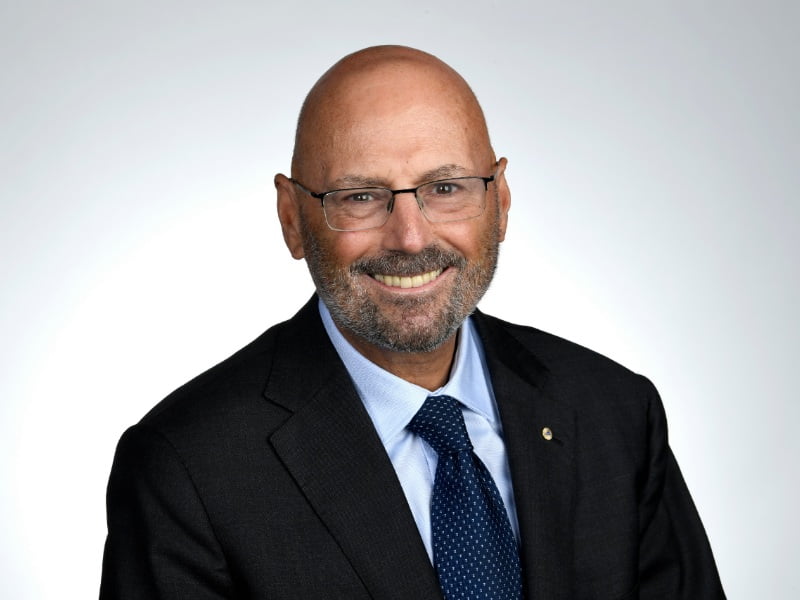Former Industry Minister and Liberal senator Arthur Sinodinos returned to Parliament this week after surviving a battle with cancer, and eager to make a further contribution to the Parliament from the backbench.
“It’s good to be back,” he told InnovationAus.com. “Work is a good part of the recovery process. I’m pacing myself and I’ve been gratified by the warm welcome I’ve received from my colleagues on all sides.”
The Senator has been on leave since September 2017 after being diagnosed with non-Hodgkin lymphoma, which resulted in him resigning from his role as Industry minister.

“When you go through that experience of having cancer and at least today having survived cancer, you do think about the future,” he said reflecting on his battle.
“It affects your priorities. It affects your use of time. Time becomes more precious, and you shouldn’t put things off on the assumption that you’ve got infinite time, because none of us have that.
“[The situation] taught me to not worrying about sweating the small stuff and that’s where the prioritisation comes in and helping where you can. You also gain a new empathy because you’re walking in the shoes of others and you understand how they’ve been affected by illness. I think that makes you a more empathetic human being.”
The senator returns just in time for discussions as some of the most controversial issues begin to heat up, including the Consumer Data Right law and the so-called Assistance and Access Act.
He has been to the Parliament just once since taking leave, when he briefly slipped into the building in August last year to support one of his closest colleagues and political ally Malcolm Turnbull during the leadership spill.
As a backbencher, he will focus on supporting the government in NSW ahead of the next federal election in May, specifically around innovation.
Part of that will involve working with enterprises, entrepreneurs, industry associations, government departments, and current industry minister Karen Andrews.
“I’m very keen to entrench the innovation mindset of Australian business and particularly see it build a sustainable innovation ecosystem,” Senator Sinodinos said.
“We’ve got a lot of really promising things happening in Australia. The venture capital industry has really taken off, but we really need to create conditions to maximise a number of startups, which can be a source of new jobs and be the big companies of the future. I’m really keen to see them develop.”
Commercialisation is also high on the agenda for the Senator, who recognises that Australian industry still lag compared to international counterparts in research and development, and R&D collaborations.
“One of the issues around this innovation mindset is improving the collaboration between industry, public, and research institutions. We don’t do it quite as well as many overseas countries, particularly in places like the US where there’s a real culture of commercialisation and research,” he said.
“I think that’s important but improving those collaboration links is going to be a bit of a challenge going forward.”
Senator Sinodinos added he will also look into workplace arrangements that are being affected by artificial intelligence, machine learning and digitisation. He said that while job displacement might be a “big challenge”, it should be faced with optimism.
“We need to look at how we maximise the benefits, rather than being fearful of the impact of change. The best way to deal with change is to accept it’s happening and then owning the change and managing it,” he said.
“We’re reviewing the vocational and education training system. I think that’s going to become increasingly important in providing people bite-size modules that people can undertake so they can have life-long learning. We have to get into this mindset that our jobs could change several times over our working lives.”
These priorities, however, are not entirely new to the Senator. Prior to his leave of absence, he released a consultation paper as the first step towards developing a Digital Economy Strategy.
The government quietly published its response to the strategy in December – 18 months after Senator Sinodinos handed the responsibility over to Michaelia Cash, who succeeded him, before it got passed onto Ms Andrews.
“I’m keen to make sure those recommendations [made in the strategy] now that they’ve come to fruition from the government are executed properly,” Senator Sinodinos said.
He has also set his sight on creating an industry framework for Australia, which will follow on from his work on setting up a review into the nation’s existing space capabilities and appointing Megan Clarke to head it up.
“My aim there was to create a framework for industry relevant to Australia, relevant to space, so it’s not just about having a space agency, it’s about that framework that can create new jobs in a new industry,” Senator Sinodinos said.
“What we’ve got think about is how do we use the leaders in government and everything else at our disposal to create new industries, new opportunities and good high paying jobs.”
What Senator Sinodinos will leave to Ms Andrews to continue to handle is the Women’s Advisory Roundtable, which he setup to reduce the barrier of entry for female entrepreneurs. Since handing over the responsibilities, the women’s roundtable has only met once.
Despite this, Senator Sinodinos said he will “happily support” the work that Ms Andrews has been doing with the roundtable.
Do you know more? Contact James Riley via Email.

